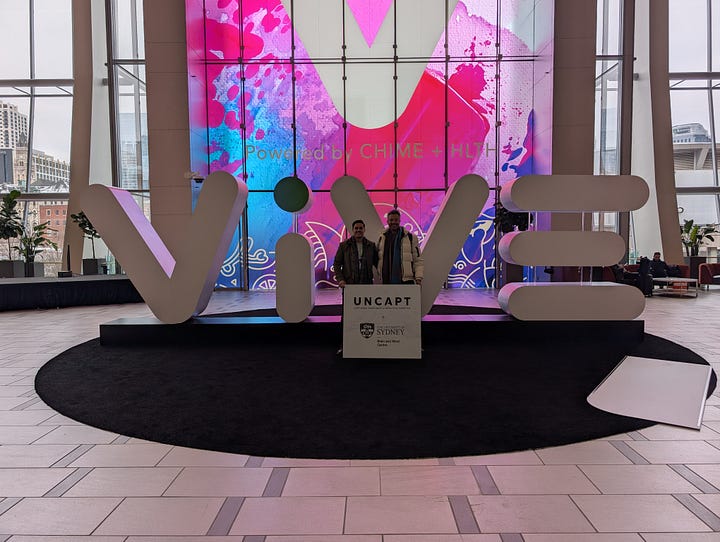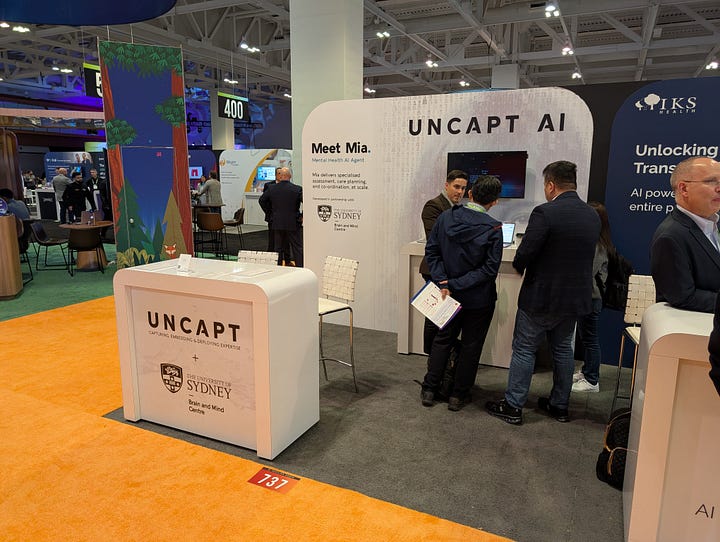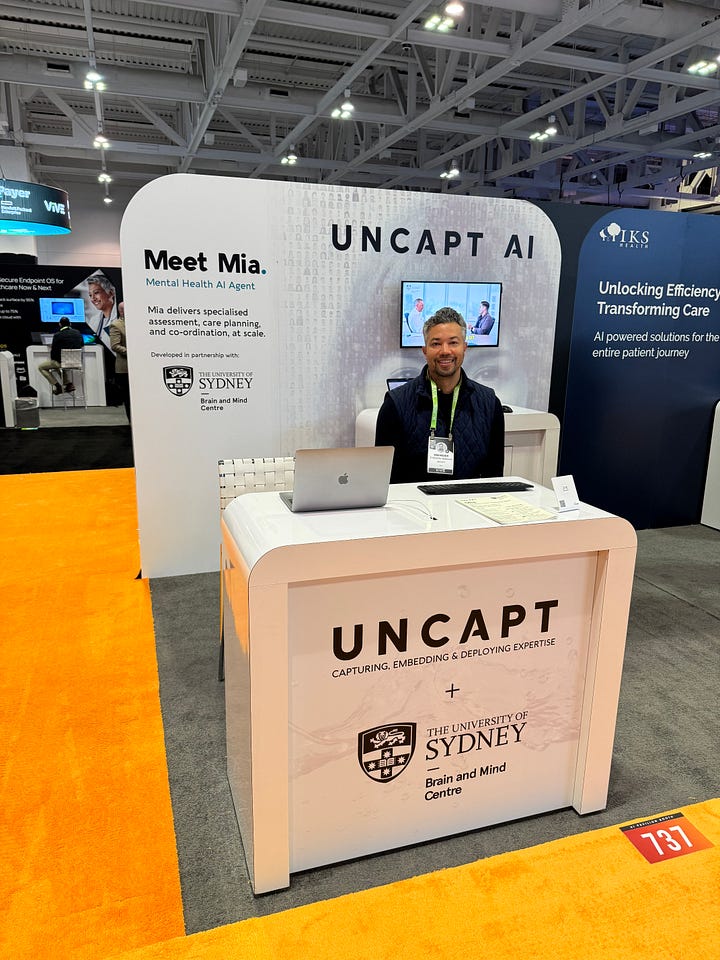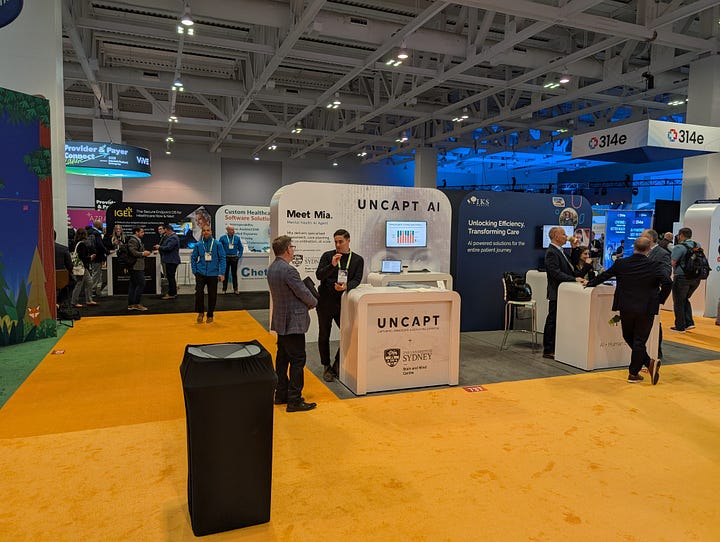AI and scaling expertise for better mental health care
Showcasing the Mental health Intelligence Agent (Mia) at ViVE 2025
Last week, the ViVE conference in Nashville buzzed with conversations about the future of health care. From ambient AI to sophisticated data analytics tools, it was clear that artificial intelligence (AI) is increasingly viewed as a critical component for transforming the way we deliver care. However, amidst the grand discussions on AI’s role in diagnostics, easing administrative burden, and virtual care, mental health received less attention. That’s why I was particularly excited that we had the opportunity to fill this gap and introduce Mia—the Mental Health Intelligence Agent—showcasing the potential of AI to reshape mental health care.
You can watch the video below to hear Professor Ian Hickie and myself in conversation about this work.
AI in health care: An exciting frontier
AI has become a driving force in many sectors, but health care stands to benefit immensely from its capabilities. With rising demand, the mounting complexity of conditions, and logistical challenges in care coordination, AI can help bridge the gaps that human labour alone cannot fill.
While AI in health care can sometimes feel futuristic, it has already begun to reshape day-to-day clinical practice—ambient AI for note-taking and documentation, for instance, is already a standard feature in many settings. Yet we are only at the beginning of this transformation. Simply using AI to assist or replace existing tasks or roles is not enough; instead, we must reimagine how we work and deliver care if we are going to meet the needs of the population.
This requires the creative exploration of new models of service delivery supported by new tools. This can unlock AI’s true potential and pave the way for more accessible, efficient, and impactful health care for everyone.
The growing demand for care requires innovative solutions
Worldwide, demand for mental health care is rising. Unfortunately, our existing systems often struggle to keep up, leaving many people without timely or high-quality support. Services are fragmented and workforce shortages remain a persistent challenge. Variability in clinical expertise—due to difference in skills, experience, and training—further contributes to uneven standards of care across the system.
We cannot keep hiring more staff to fill gaps in our system (this is not scalable or realistic). Recent advancements in AI, agentic-AI and large language models present a transformative opportunity to address these challenges. AI systems can gather information systematically, recognise patterns, and synthesise knowledge in ways that closely mirror expert assessment and subsequent decision-making. The use of agentic-AI means tasks can be allocated to technology to assist limited workforces in powerful ways.
To harness this potential, through a collaboration between the Brain and Mind Centre at the University of Sydney and UNCAPT, we developed the Mental Health Intelligence Agent (Mia)—an expert AI system designed for specialised assessment, care planning, and coordination. Mia was built through rigorous co-design and testing with clinicians, researchers, and individuals with lived experience, ensuring that it accurately captures mental health expertise. It embeds decades of our expertise and research into its knowledge base to provide specialised level mental health support.
This is where AI has a unique opportunity to drive equitable access to mental health services. An agentic-AI like Mia can scale clinical capacity beyond the limitations of human staffing. By offering expert-level assessment, care planning, and care coordination, Mia helps free up clinicians’ time for the more nuanced or complex elements of treatment while ensuring consistency and quality.
Showcasing Mia at ViVE 2025
At this year’s ViVE conference, there was a broad focus on emerging technologies, but mental health did not feature as prominently as some other areas of health. Nevertheless, many attendees were excited to see how AI could transform mental health—a field historically marked by underfunding and under-prioritisation.
The core message we shared was that by incorporating an AI-driven solution like Mia, we can not only improve access to mental health services but also enhance the consistency and quality of care for every individual. Mia demonstrates that these benefits are not some distant dream; they are achievable now, and they can help address the huge demand we currently face for mental health support.




The excitement around AI in health care is justified. Yet, the real triumph will be realised when we translate this momentum into tangible benefits for underserved areas. By showcasing Mia at ViVE, we underscored the importance of innovation in mental health and demonstrated that this sector must not be left behind in the broader surge of AI adoption. If we seize the opportunity to integrate AI-driven solutions thoughtfully and ethically, we can ensure that no matter where someone enters the system, they receive personalised, high-quality mental health care, and reach the services they need faster.
Beyond research, towards impact
Taking a novel idea from the research lab into real-world practice is one of the most critical steps for achieving meaningful impact. Academic research often generates promising insights, but their true value is realised when tested under real-world pressures—where consumer needs, workforce constraints, cost concerns and system inefficiencies collide. Rigorous pilot studies and early-stage trials help to refine these ideas to ensure that solutions are theoretically sound, but the real test comes in practice.
This journey from concept to implementation is precisely how Mia evolved. It began as an idea, then became a simple proof of concept and is now a tangible tool ready for real-world testing and scaling. We have refined, tested, and iterated the underlying technology, and now the exciting challenge is to integrate it into clinical settings and pathways, where it can make a genuine difference to people’s lives.
This focus on research translation reminds us that innovation must not end in the lab; it must be carried forward to the real-world settings to truly transform mental health care.
Mia’s presence at the ViVE conference served as a powerful reminder: mental health should be at the forefront of AI-driven innovation in health care. By tackling workforce constraints and ensuring higher consistency in clinical quality, agentic-AI solutions can transform the mental health landscape—bringing us closer to a world where everyone has prompt, equitable access to the care they deserve.



